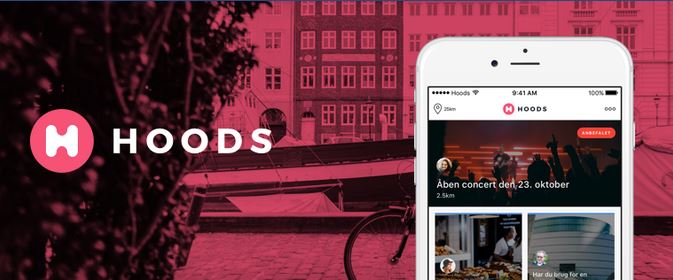The Danish App Hoods, which launched in November, has a namesake in the United States – that is, a similar app with the same name. But what are the rules really when you happen to have the same good idea as someone in another country?
The idea was sound. It originated from a need the founder, Susanne Sandsberg, experienced after she moved back to Denmark after 12 years abroad in the United States. There didn’t seem to be an easy portal to interact with the community, so she made the app Hoods. Inspired by the American site Craigslist, the geo-based app was intended to make it easier to communicate the the local community to help with everything from childcare to borrowing tools to giving away old furniture.
In Denmark, there are no sites similar to Craigslist, and Hoods seemed like a sure fit to fit an untackled niche. But quite far into the development process, the founders discovered another, similar business in the United States.
The American Hoods
Hoods, an app founded in 2013 in San Francisco, also aimed to make it easier to communicate with people nearby that you may not know, and facilitate the exchange of information around neighborhoods.
But the American App Hoods had already closed down in 2014, the Danish app was even was founded in 2016.
“If you have a good idea, and if you have come a long way with it, you have a tendency to drive on regardless of obstacles. It took a while before we discovered that there was an earlier version. We researched it and they had collected [a seed round], but gone under, “says Susanne Sandsberg.
Control your trademarks
While the US founders had an app store account attached to Hoods, there did not seem to be any trademark rights being violated. Attorney and trademark specialist at Awapatent Mette Bender agrees.
“It does toe the line. In such a situation, it is always best to get legal assistance and do research thoroughly and early, “she says.
There may be several different types of rights at stake, and business owners must be especially aware of trademarks or patents. In a case like Hoods, there will probably be primarily trademarks, ie names, logos, and any slogans that may characterize a business.
“The name could easily be trademarked. But trademarks are territorially defined, so the US Hoods only has name protection in the United States. This is not a question of novelty, as with patents,” explains Mette Bender. The patent requirement means that if you invent a brand new product and patent it in your own country, it may be difficult for other to patent it in Denmark, even though the original patent is only covered in the country of origin.
If you are global, your name must also be registered globally
In Hood’s case of trademark registration, it is important to be awards of your rights, not least because many companies today think globally from the beginning.
“If you plan to expand, it’s a good idea to register your name in the countries you regard as your core markets,” says Mette.
After investigating the situation with Hoods, Mette can see that there are no problems with the Danish company using the same name – the US company never trademarked the name in Denmark, and the company closed down a few years ago.
If you act in bad faith, there are exceptions
Mette says there is an exception if you have acted in bad faith, and have been aware of the company sharing your name from the start.
Anyone can do a simple check to see if their company is registered anyplace else. The vast majority of countries have publicly available trademarks.
“You can get really far with a few hours of targeted searched on Google and in available registries. Unfortunately, IPI rates are rarely the first thing people think about when they start a business. But it may be very expensive to start all over again if it turns out others have registered your name already,” says Mette.
 Nordic Startup News Early Stage Startup News From The Nordics
Nordic Startup News Early Stage Startup News From The Nordics


